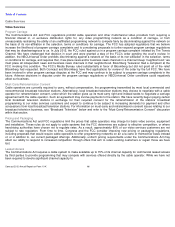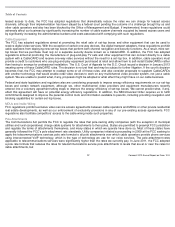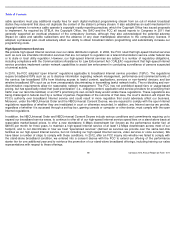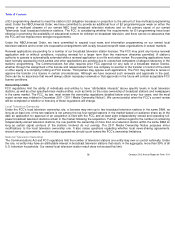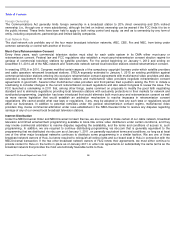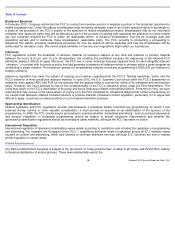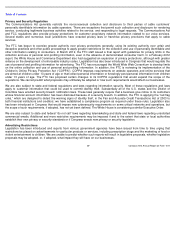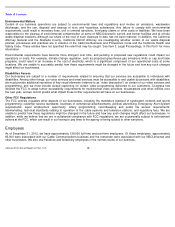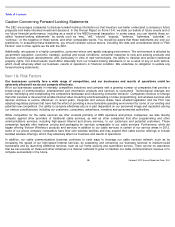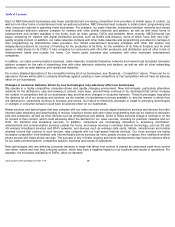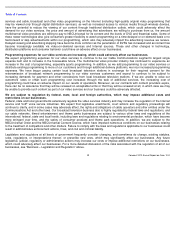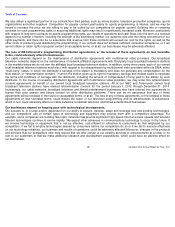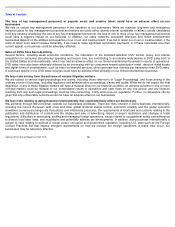Comcast 2012 Annual Report Download - page 29
Download and view the complete annual report
Please find page 29 of the 2012 Comcast annual report below. You can navigate through the pages in the report by either clicking on the pages listed below, or by using the keyword search tool below to find specific information within the annual report.
Table of Contents
licensing of motion pictures unless theater owners are first invited to attend a screening of the motion pictures and, in certain
instances, also prohibit payment of advances and guarantees to motion picture distributors by exhibitors. Further, under various
consent judgments, federal and state antitrust laws and state unfair competition laws, motion picture companies are subject to
certain restrictions on trade practices in the United States, including a requirement to offer motion pictures for exhibition to theaters
on a theater-by-theater basis. The Federal Trade Commission (“FTC”)
has called for stronger industry safeguards applicable to the
marketing of violent movies to children.
In countries outside the United States, there are a variety of existing or contemplated governmental laws and regulations that may
affect our ability to distribute and license motion picture and television products, as well as consumer merchandise products,
including film screen quotas, television quotas, regulation of content, regulated contract terms, product safety and labeling
requirements, discriminatory taxes and other discriminatory treatment of U.S. products. The ability of countries to deny market
access or refuse national treatment to products originating outside their territories is regulated under various international
agreements.
Theme Parks
Our theme parks are subject to various regulations, including laws and regulations regarding environmental protection, privacy and
data protection, consumer product safety and theme park operations, such as health, sanitation, safety and fire standards and liquor
licenses.
Other Areas of Regulation
Intellectual Property
Copyright, trademark, unfair competition, patent, trade secret and Internet/domain laws of the United States and other countries help
protect our intellectual property rights. In particular, piracy of programming and films through unauthorized distribution of counterfeit
DVDs, peer-to-
peer file sharing and other platforms presents challenges for our cable networks, broadcast television and filmed
entertainment businesses. The unauthorized reproduction, distribution or display of copyrighted material over the Internet or through
other methods of distribution, such as through devices, software or websites that allow the reproduction, viewing, sharing and/or
downloading of content by either ignoring or interfering with the content’
s security features and copyrighted status, interferes with the
market for copyrighted works and disrupts our ability to exploit our content. The extent of copyright protection and the use of
technological protections, such as encryption, are controversial. Modifications to existing laws that weaken these protections could
have an adverse effect on our ability to license and sell our programming.
While many legal protections exist to combat piracy, laws in the United States and internationally continue to evolve, as do
technologies used to evade these laws. We have actively engaged in the enforcement of our intellectual property rights and likely will
continue to expend substantial resources to protect our content. The repeal of laws intended to combat piracy and protect intellectual
property or weakening of such laws or enforcement in the United States or internationally, or a failure of existing laws to adapt to new
technologies, could make it more difficult for us to adequately protect our intellectual property rights, which could negatively impact
their value and further increase the costs of enforcing our rights.
Copyright laws also require that we pay standard industry licensing fees for the public performance of music in the programs we
distribute, such as local advertising and local origination programming on our cable systems, as well as in the content we create. The
fees we pay to music performance rights organizations are typically renegotiated when we renew licenses with those organizations,
and we cannot predict with certainty what those fees will be in the future or if disputes will arise over them.
Comcast 2012 Annual Report on Form 10
-
K
26


